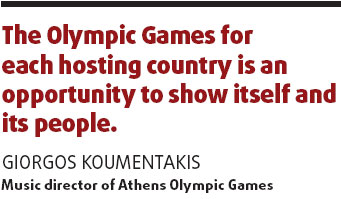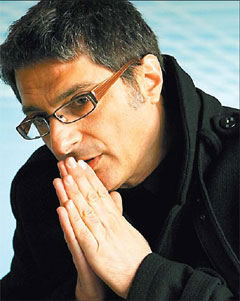Chord of the rings
Doodling has always made Giorgos Koumentakis feel relaxed. "I feel nervous when I am talking and become the center of a conversation," Koumentakis says while scribbling on a bit of paper. The music director of the Athens Olympics opening and closing ceremonies says this habit has helped produce good results.
"I scribble the idea in my head while I am thinking and composing. Those random thoughts inspire me," he says.
When the topic turns to his music, he talks more freely using hand gestures but he still reverts to scribbling down his ideas, which lead to an interesting comment about the Beijing Olympics.
"No comment," Koumentakis says.
|
Giorgos Koumentakis thinks Beijing offers both ancient and modern culture. Guo Yingguang |
He explains that when he was the Athens Olympic director, most of the suggestions he heard at the time proved wrong.
"Nobody knows what the composer is thinking but himself," he says.
As one of the most recognized Greek composers of his generation, Koumentakis' works encompass a wide range of musical idioms and his music constantly evolves in new directions. In 1992, he became the first and only Greek composer to win the Prix de Rome, a competition started in 1803 that has been won by legendary composers, such as Berlioz, Gounod, Bizet and Debussy.
In the lead up to the 2004 Games, the Athens Olympic chairman invited many musicians to discuss ideas for the opening and closing ceremonies. After the talks, Koumentakis shut himself and his team away in his home for months and finished an original series of works including music, performances and stage designs.
"The committee wanted breakthroughs from the traditional music. Our ideas, compared with other well-known musicians then, were quite new and fresh, which was the main reason why we won the competition I guess," he says.
During a three-year preparation, Koumentakis collected all the Olympic video records he could find to better understand what had been done before. He also visited the Greek countryside to collect folk music, which impressed him a lot. "I learnt a lot during the process of accumulating music, especially traditional Greek music," he says.
"The Olympic Games for each hosting country is an opportunity to show itself and its people. So the basic element for making Olympic music is to present Greek culture, tradition and people in the way of music as well as combining with modern society."
Koumentakis says his final music was somewhat electronic and it perfectly energized the audience and athletes.
"They were so excited and clapped heir hands as if they were possessed."
At that moment, Koumentakis knew he had succeeded. However, it was a long odyssey for the Greek. "I used to work by myself or just with a small group of people whom I was familiar with," he says. "But the Olympic Games required teamwork and I felt huge responsibility on my shoulders."
Aside from the music, the most difficult task for Koumentakis during his Olympic preparations was communicating with hundreds of thousands of people. It made him very tired.
"I yearned to live in a place far away from the noise and troubles of the world," he says. So, after the Olympics, Koumentakis moved from Athens to a small island and still lives there to this day.
Koumentakis says he will never embark on such a task again. "When you are in that position, you are busy like Superman, you feel like you're at the center of the world. However, when the flame dies, the city returns to its regular rhythm, you feel you have nothing left and so empty," he says.
Now he's happy after returning to his day job of being a "simple music composer".
In his first Beijing visit, Koumentakis participated in two Greek concerts on Friday and Saturday, which were part of the Greek Culture Year.
Commissioned by the Thessaloniki State Symphony Orchestra, Koumentakis brought his new work Amor Fati, a composition created specifically to mark the 100th birthday of famous Greek author Nikos Kazantzakis.
"Nikos Kazantzakis was very positive towards life and this is the main characteristic of people of Crete Island," he says. "I am from Crete as well so my music for commemorating the late author is full of hope and upbeat."

He explains that the two concerts feature a new and unique musical form, which fuses native Greek music and multi-national elements.
"Greece enjoys a favorable geographic location, as it lies at the crossroads of three continents - Europe, Asia and Africa," he says. "It has been a melting pot for the fusion of many great and distinctive cultures.
"Therefore, a new music culture was born, which incorporated diversified music genres from throughout the world. We hope this kind of blending will be stimulating and exciting to the audience."
He has read books about Chinese literature, heard music from Tan Dun, and communicated with Zhang Yimou at the 2004 Athens Olympic Games. "All those make me interested in China," he says.
He has visited Olympic venues in Beijing and says: "The architectures are full of modern concepts and Beijing, as an ancient city, will present a good combination of its history and culture in the modern buildings. It is just like the music which is a mix of past and now."
(China Daily 12/18/2007 page19)















